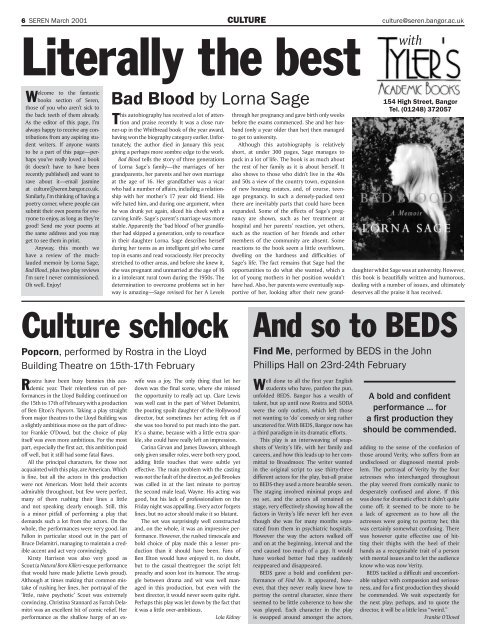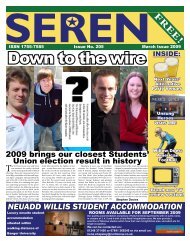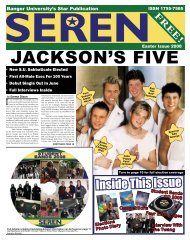Inside - Seren
Inside - Seren
Inside - Seren
- No tags were found...
Create successful ePaper yourself
Turn your PDF publications into a flip-book with our unique Google optimized e-Paper software.
6 SEREN March 2001 CULTURE culture@seren.bangor.ac.ukLiterally the bestwithWelcome to the fantasticbooks section of <strong>Seren</strong>,those of you who aren’t sick tothe back teeth of them already.As the editor of this page, I’malways happy to receive any contributionsfrom any aspiring studentwriters. If anyone wantsto be a part of this page—perhapsyou’ve really loved a book(it doesn’t have to have beenrecently published) and want torave about it—email Jasmineat culture@seren.bangor.co.uk.Similarly, I’m thinking of having apoetry corner, where people cansubmit their own poems for everyoneto enjoy, as long as they’regood! Send me your poems atthe same address and you mayget to see them in print.Anyway, this month wehave a review of the muchlaudedmemoir by Lorna Sage,Bad Blood, plus two play reviewsI’m sure I never commissioned.Oh well. Enjoy!Bad Blood by Lorna SageThis autobiography has received a lot of attentionand praise recently. It was a close runner-upin the Whitbread book of the year award,having won the biography category earlier. Unfortunately,the author died in January this year,giving a perhaps more sombre edge to the work.Bad Blood tells the story of three generationsof Lorna Sage’s family—the marriages of hergrandparents, her parents and her own marriageat the age of 16. Her grandfather was a vicarwho had a number of affairs, including a relationshipwith her mother’s 17 year old friend. Hiswife hated him, and during one argument, whenhe was drunk yet again, sliced his cheek with acarving knife. Sage’s parent’s marriage was morestable. Apparently the ‘bad blood’ of her grandfatherhad skipped a generation, only to resurfacein their daughter Lorna. Sage describes herselfduring her teens as an intelligent girl who cametop in exams and read voraciously. Her precocitystretched to other areas, and before she knew it,she was pregnant and unmarried at the age of 16in a intolerant rural town during the 1950s. Thedetermination to overcome problems set in herway is amazing—Sage revised for her A Levels154 High Street, BangorTel. (01248) 372057through her pregnancy and gave birth only weeksbefore the exams commenced. She and her husband(only a year older than her) then managedto get to university.Although this autobiography is relativelyshort, at under 300 pages, Sage manages topack in a lot of life. The book is as much aboutthe rest of her family as it is about herself. Italso shows to those who didn’t live in the 40sand 50s a view of the country town, expansionof new housing estates, and, of course, teenagepregnancy. In such a densely-packed textthere are inevitably parts that could have beenexpanded. Some of the effects of Sage’s pregnancyare shown, such as her treatment athospital and her parents’ reaction, yet others,such as the reaction of her friends and othermembers of the community are absent. Somereactions to the book seem a little overblown,dwelling on the hardness and difficulties ofSage’s life. The fact remains that Sage had theopportunities to do what she wanted, which alot of young mothers in her position wouldn’thave had. Also, her parents were eventually supportiveof her, looking after their new granddaughterwhilst Sage was at university. However,this book is beautifully written and humorous,dealing with a number of issues, and ultimatelydeserves all the praise it has received.Culture schlockPopcorn, performed by Rostra in the LloydBuilding Theatre on 15th-17th FebruaryAnd so to BEDSFind Me, performed by BEDS in the JohnPhillips Hall on 23rd-24th FebruaryRostra have been busy bunnies this academicyear. Their relentless run of performancesin the Lloyd Building continued onthe 15th to 17th of February with a productionof Ben Elton’s Popcorn. Taking a play straightfrom major theatres to the Lloyd Building wasa slightly ambitious move on the part of directorFrankie O’Dowd, but the choice of playitself was even more ambitious. For the mostpart, especially the first act, this ambition paidoff well, but it still had some fatal flaws.All the principal characters, for those notacquainted with this play, are American. Whichis fine, but all the actors in this productionwere not American. Most held their accentsadmirably throughout, but few were perfect,many of them rushing their lines a littleand not speaking clearly enough. Still, thisis a minor pitfall of performing a play thatdemands such a lot from the actors. On thewhole, the performances were very good. IanFallon in particular stood out in the part ofBruce Delamitri, managing to maintain a credibleaccent and act very convincingly.Kirsty Harrison was also very good asScout (a Natural Born Killers-esque performancethat would have made Juliette Lewis proud).Although at times making that common mistakeof rushing her lines, her portrayal of the‘little, naive psychotic’ Scout was extremelyconvincing. Christina Stannard as Farrah Delamitriwas an excellent bit of comic relief. Herperformance as the shallow harpy of an exwifewas a joy. The only thing that let herdown was the final scene, where she missedthe opportunity to really act up. Clare Lewiswas well cast in the part of Velvet Delamitri,the pouting spoilt daughter of the Hollywooddirector, but sometimes her acting felt as ifshe was too bored to put much into the part.It’s a shame, because with a little extra sparkle,she could have really left an impression.Carina Girvan and James Dawson, althoughonly given smaller roles, were both very good,adding little touches that were subtle yeteffective. The main problem with the castingwas not the fault of the director, as Jed Brookeswas called in at the last minute to portraythe second male lead, Wayne. His acting wasgood, but his lack of professionalism on theFriday night was appalling. Every actor forgetslines, but no actor should make it so blatant.The set was surprisingly well constructedand, on the whole, it was an impressive performance.However, the rushed timescale andbold choice of play made this a lesser productionthan it should have been. Fans ofBen Elton would have enjoyed it, no doubt,but to the casual theatregoer the script feltpreachy and soon lost its humour. The strugglebetween drama and wit was well managedin this production, but even with thebest director, it would never seem quite right.Perhaps this play was let down by the fact thatit was a little over-ambitious.Lola KidneyWell done to all the first year Englishstudents who have, pardon the pun,unfolded BEDS. Bangor has a wealth oftalent, but up until now Rostra and SODAwere the only outlets, which left thosenot wanting to ‘do’ comedy or sing ratheruncatered for. With BEDS, Bangor now hasa third paradigm in its dramatic efforts.This play is an interweaving of snapshotsof Verity’s life, with her family andcareers, and how this leads up to her committalto Broadmoor. The writer wantedin the original script to use thirty-threedifferent actors for the play, but-all praiseto BEDS-they used a more bearable seven.The staging involved minimal props andno set, and the actors all remained onstage, very effectively showing how all thefactors in Verity’s life never left her eventhough she was for many months separatedfrom them in psychiatric hospitals.However the way the actors walked offand on at the beginning, interval and theend caused too much of a gap. It wouldhave worked better had they suddenlyreappeared and disappeared.BEDS gave a bold and confident performanceof Find Me. It appeared, however,that they never really knew how toportray the central character, since thereseemed to be little coherence to how shewas played. Each character in the playis swapped around amongst the actors,A bold and confidentperformance ... fora first production theyshould be commended.adding to the sense of the confusion ofthose around Verity, who suffers from anundisclosed or diagnosed mental problem.The portrayal of Verity by the fouractresses who interchanged throughoutthe play veered from comically manic todesperately confused and alone. If thiswas done for dramatic effect it didn’t quitecome off; it seemed to be more to bea lack of agreement as to how all theactresses were going to portray her, thiswas certainly somewhat confusing. Therewas however quite effective use of hittingtheir thighs with the heel of theirhands as a recognisable trait of a personwith mental issues and to let the audienceknow who was now Verity.BEDS tackled a difficult and uncomfortablesubject with compassion and seriousness,and for a first production they shouldbe commended. We wait expectantly forthe next play; perhaps, and to quote thedirector, it will be a little less “weird.”Frankie O’Dowd
















